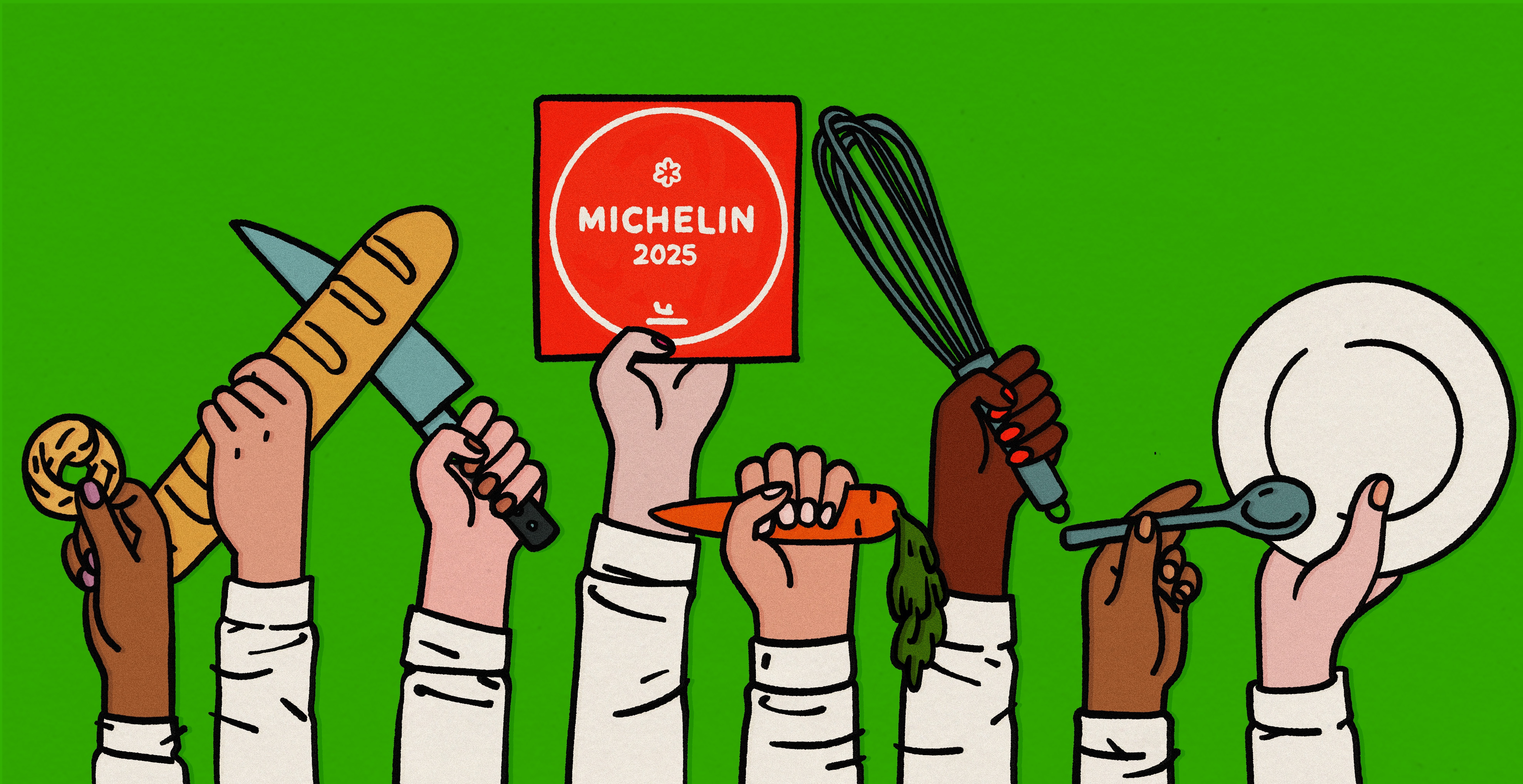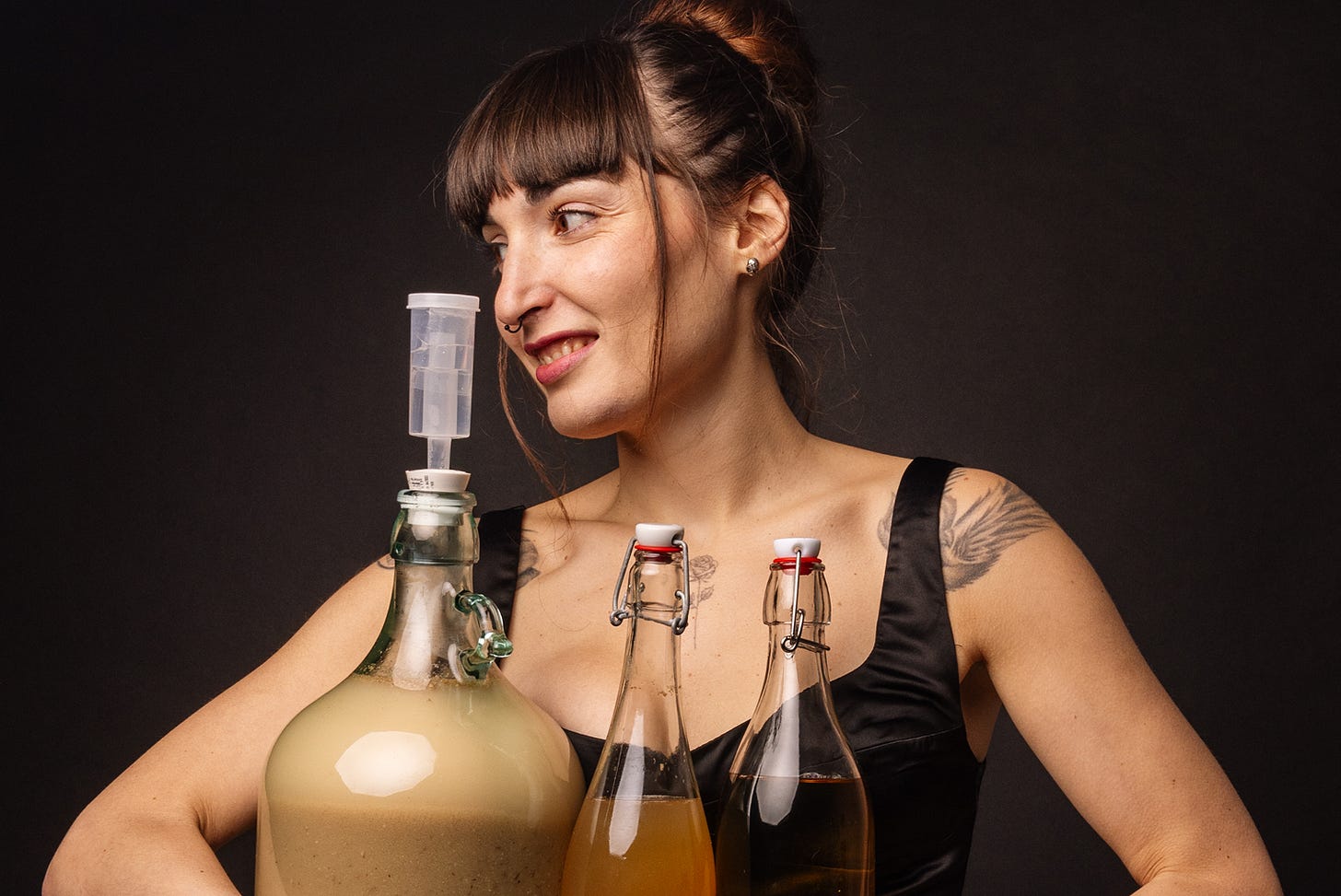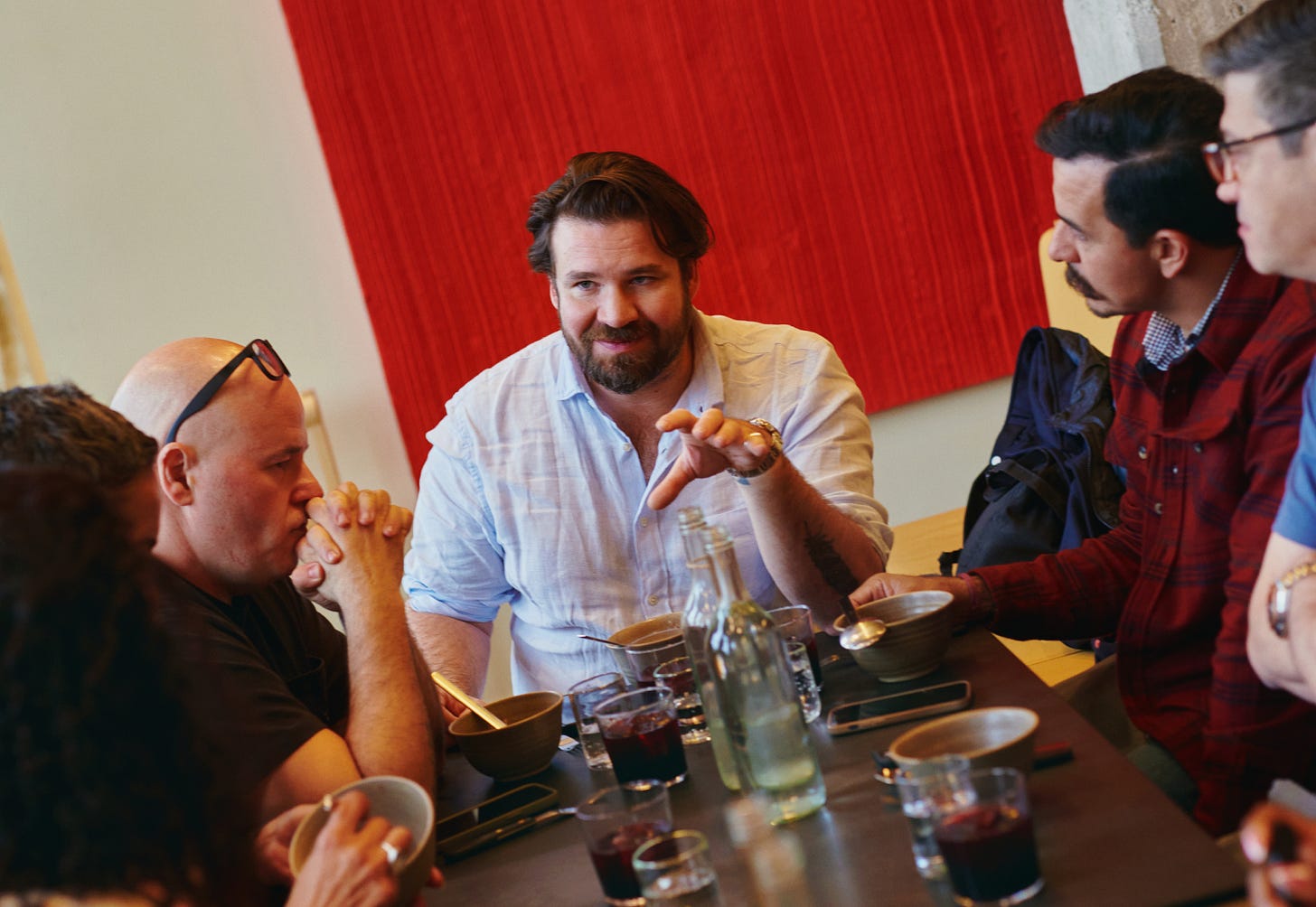Nope, Not Done Yet
A group of British women chefs reminds the world that sexism in the industry is still a thing. And MAD has a podcast!
LONG READ
An open letter from scads of women in UK hospitality reminds the industry there´s still a lot of work to do
In February, an open letter that appeared in the British newspaper The Telegraph reverberated through the UK. Addressed to “all those who benefit from the joys of dining out,” it decried the sexism that continues to flourish within the hospitality industry. “From inappropriate comments and behaviours, to unequal opportunities for advancement, these experiences hinder not only individual careers,” the authors wrote, “But the growth and innovation of our industry as a whole.`’
The letter was signed by 70 women working in hospitality, and there is nothing in the abuses and injuries it catalogues that should surprise anyone paying the slightest bit of attention to the restaurant world–or, really, the world in general. Nothing, that is, besides the trigger that provoked it: an interview with chef Jason Atherton that appeared in The Times under the headline, “I Haven’t Seen Any Sexism in the Kitchen.”
Admittedly, it was quite a claim. (Atherton, who currently owns 16 restaurants around the world, would later try to clarify, in a piece he wrote for another newspaper, that he did not mean to say that sexism didn’t exist in hospitality, only that he hadn’t witnessed it himself.) But what is perhaps more surprising is the response the letter generated: it was massive news, prompting every major outlet in the country, a bunch of minor ones, and even some foreign press to pick up the story. And it garnered a huge outpouring of support from within the industry.
Surprising because we have definitely been here before. There have been sporadic public discussions of the discrimination and harassment that women in the industry face for basically as long as there’s been an industry, but in the past decade or so, the instances in which outrage at deeply-rooted sexism has broken to the surface have grown in number and regularity. There was the galvanizing moment when TIME magazine published its now-notorious Gods of Food issue and enraged readers by neglecting to include any women in its ‘family tree’ of influential chefs. Controversy over the Best Female Chef title awarded annually by The World’s 50 Best Restaurants has flared up regularly since the prize began in 2011, including when 2018’s winner Clare Smyth admitted publicly that she had considered turning it down. That same year, the #MeToo movement finally reached the hospitality industry in the US, where it would eventually spread to other countries. (Apparently that can be a long process: some media greeted the British open letter published in February 2025 with headlines claiming that #MeToo had finally reached UK restaurants). Since then, there have been numerous books, articles, podcasts, tv series, conferences and organizations all dedicated to addressing sexism in hospitality.
Yet some progress is not the same as enough progress. While women today make up more than half the student body in many culinary schools (at the start of this century it was under a third), they still hold disproportionately few head chef positions. A 2023 survey of over 2000 Michelin-starred restaurants in 16 countries found that while a quarter of all chefs were women, only 6% of head chefs were. And while there is more awareness of what constitutes sexual harassment, less tolerance for it, and more workplace training programs in place to root it out, in some countries over 70% of women working in hospitality still say they have experienced sexual harassment themselves.
Sexism, in other words, doesn’t disappear just because it is called out one, ten, or hundreds of times. This is what seems to be where Atherton got himself into trouble. “I think there’s way too much focus on our industry because of that [sexism],” he said in The Times interview. “I think there’s too much focus on the negative side of our industry, rather than what is great like the fact that you can be any gender now in our industry and flourish."
Part of what drove the women behind the letter to take action was Atherton’s apparent assumption that the problem had been largely solved. “I think it's very scary, and I think it's very dangerous when people rest on their laurels and say, Okay, well, sexism is fixed now,” says Sally Abé, who helped organize the letter. “I couldn’t stand there and let who knows how many people who read The Times think that that's the truth.”
As the former head chef of The Pem, and the author of a rabble-rousing memoir entitled A Woman’s Place Is in the Kitchen, Abé has long been a prominent voice for women in the industry, and in some ways, the letter is proof that she and other advocates are making a difference. Eighteen months earlier, she began a WhatsApp group for female chefs, managers, and sommeliers, that was designed to encourage women to network and rely on each other more. She started it, Abé says, “because I know that the guys do the same thing, and I feel like that's something where women sort of fall down a little bit. We think that we have to be strong and do it all on our own.”
Conversation in the group normally focuses on mundane issues–recommendations for a good sous chef looking for a new job, debates on the best oven cleaner. But when the Atherton interview came out–followed just a few days later by a Michelin ceremony that awarded a star to only one woman chef in the UK–things got fired up.
“There was a huge response amongst the group,” says Dara Klein, chef and founder of Tiella, who, along with Abé, initiated the letter. “There was just shock and disbelief that someone would say, on the record, that essentially the experiences of hundreds and hundreds of people just doesn’t exist.”
Klein set up a Google doc for members to document their experience, and the abuses began pouring out: inappropriate jokes and sexualized comments; the ‘pats on the bum,’ and other unwanted touching, the passed over promotions and unfair wages; the staff members who refused to accept their authority and diners who refused to believe the woman in the jacket in front of them was actually the head chef. At the group’s request, journalist Joanna Taylor interviewed the women, compiled their experiences and grievances in a story for The Telegraph, and published the open letter–signed by chefs like Helen Graham, Chantelle Nicholson and former MAD Symposium speaker Romy Gill– alongside it.
“Almost immediately, it had quite an explosive response,” says Klein. “As soon as it landed, the press requests were coming through steadily. It was a very, very intense time.”
A lot of that intensity came from the media attention. But the rest came from colleagues in the industry. “There were so many people who were really vocal with their support,” Klein says. “Men and women alike from the industry who all said the kind of same thing, which is that, I think, for the next wave of change and and progress to happen in professional kitchens,we really need to get the backing of men. I was really happy to get that conversation building.”
Abé agrees. “It has made a lot of people, including male chefs, think, ‘Okay, what can I do to make sure this doesn't happen in my kitchen? What can I do to rectify the situation? And that’s exactly what it was supposed to do. It was supposed to be that sort of point where people say, ‘Oh, shit. Maybe I need to think about that.’”
It’s not as though previous moments of awareness and activism haven’t had an impact: most young people in culinary school now have little tolerance for the kind of mistreatment that older generations considered a routine part of the job. “I definitely think that this generation is standing up for themselves, which is great to see,” Abé says. “Maybe if we had done that in the early 2000s, we wouldn't be where we are now.”
But as Atherton’s comments suggest, it’s possible that those same moments of increased awareness, and the real if incomplete improvements they have engendered, have led some to feel like they’re off the hook. Poppy O’Toole, who also contributed to the letter’s formulation and impact, put it this way: ‘‘It was worse before’ ; ‘we have bigger problems’; and ‘we’ve moved on’ doesn’t really cut it,” she wrote on Instagram as she shared many examples from colleagues of the mistreatment they had suffered in the workplace because of their gender. “Let their stories be enough reason to be better.”
With a new job (Abé) and a new book (Klein) underway—to say nothing of all the challenges the British hospitality industry is facing right now—both of the organizers have struggled to fit their advocacy work into the business of running their restaurants. But they understand that even in the best of times, progress will be slow and often uneven; what matters is to keep going. “Societal change doesn't happen overnight,” Abé says. “Everybody thinks that the suffragettes, with their protests and their little flags got the vote like that. But it took them a hundred years! Social change takes time.”
In the meantime, they take their encouragement where they can get it. “I recently heard a statistic that said that, at the rate we’re going, we're not going to achieve gender parity until five generations from now,” Abé says. “Obviously, that’s heartbreaking. But there's a small part of me that's like, well, at least we are going in that direction.”
ACADEMY ALUMNI
An interview with Esther Merino
After a detour from law school (and a fateful stint serving mash and meatballs at IKEA), MAD alum Esther Merino found her true calling in hospitality. Four immersive years in Copenhagen, working with some of the city’s most progressive restaurants, saw her rise as a standout front-of-house pro and boundary-pushing beverage developer. Now back in Spain, Esther is splitting her time between teaching at the Basque Culinary Center and diving deep into the intersections of anthropology, gastronomy, and innovation to rethink what exceptional service—and a great drink—can really be.
How did your career in hospitality begin, and what made you fall in love with the industry?
I actually studied law originally, but in my final year, an IKEA opened in my city, Valladolid. What started as serving meatballs eventually led to me becoming a restaurant manager. It might surprise people, but working there was an amazing experience—the way IKEA empowers and cares for its employees really stuck with me. Then the first Bachelor's in Gastronomy and Culinary Arts launched at the Basque Culinary Center, and that’s where I truly fell in love with gastronomy, and front-of-house (FOH) work in particular, even though I trained as a chef. I realized it’s not just about the food; it’s about the whole guest experience. As FOH, when you’re serving wine, you're representing the winemaker. When you're plating, you're representing the chef who spent hours on that sauce. My thesis in anthropology explored the link between human behavior and the culinary world. Over time, I became especially interested in beverage innovation.
WHAT WE’VE BEEN UP TO
MAD’s founder René Redzepi hosts our first podcast
With just seven weeks to go until MAD7, we’re sending a little anticipatory treat out into the world. Our first podcast, MAD Talks, features René Redzepi, chef of noma and founder of MAD, in conversation with some of our most iconic speakers from Symposiums past.
In episode one, René sits down with Magnus Nilsson, author, apple farmer, occasional moose fondue-maker and—most famously— the chef behind Fäviken. They chat about Magnus’ experiences of opening and closing that ground-breaking restaurant in northern Sweden and the “ordinary” place he’ll launch later this year. And they explore what building to last—the theme of the next MAD Symposium—means to him.
Now available on Spotify, Apple, and wherever you get your fresh podcasts.
MAD Academy meets Marriott’s The Luxury Collection
MAD Academy is working with The Luxury Collection, part of Marriott Bonvoy, to develop training programs for its chefs, focussed on hands-on skills in environmental sustainability, empowerment and equitable leadership. The first training session took place in November and was led by some of our MAD Academy superstars, including chefs Matthew Orlando and Christian Puglisi, and sustainable resort-owner Portia Hart. The Luxury Collection, which includes over 40 properties around the world, sent chefs from 13 hotels to explore practical strategies for short and long-term sustainability, and further training programs are planned throughout 2025. Read the great write-up in Food & Wine, or get in touch to learn more about MAD’s custom programs.









Good Luck Esther with this new chapter 🌸🌺